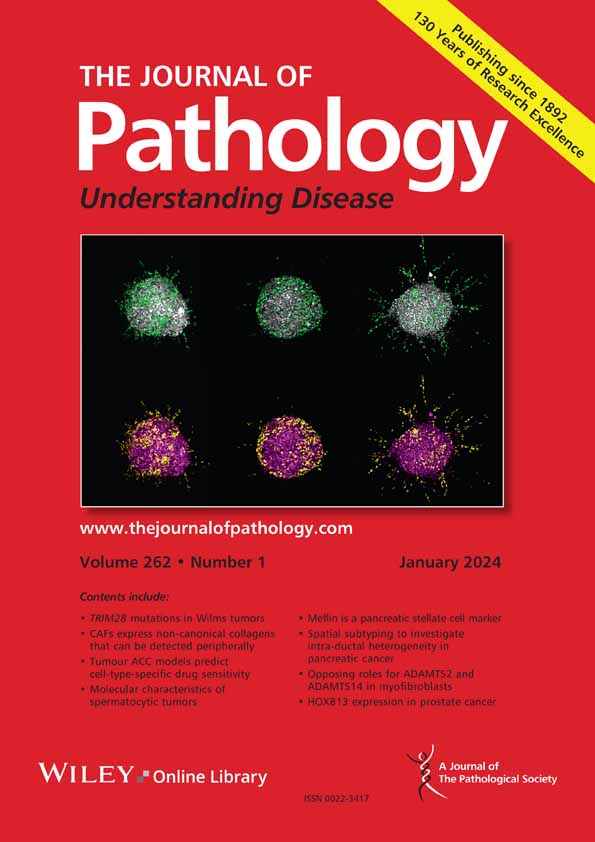Histologic and molecular features shared between antibody-mediated rejection of kidney allografts and chronic histiocytic intervillositis support common pathogenesis
IF 5.2
2区 医学
Q1 ONCOLOGY
Léonie Albersammer, Juliette Leon, Jelena Martinovic, Jessy Dagobert, Emilie Lebraud, Bettina Bessières, Laurence Loeuillet, Maëva Eloudzeri, Alexandre J. Vivanti, Grégoire Dumery, Valérie Marchaudon, Cristina Antal, Anne-Sophie Korganow, Thibaud Quibel, Nathalie Costedoat-Chalumeau, Vassilis Tsatsaris, Alexandra Benachi, Julien Zuber, Marion Rabant
下载PDF
{"title":"Histologic and molecular features shared between antibody-mediated rejection of kidney allografts and chronic histiocytic intervillositis support common pathogenesis","authors":"Léonie Albersammer, Juliette Leon, Jelena Martinovic, Jessy Dagobert, Emilie Lebraud, Bettina Bessières, Laurence Loeuillet, Maëva Eloudzeri, Alexandre J. Vivanti, Grégoire Dumery, Valérie Marchaudon, Cristina Antal, Anne-Sophie Korganow, Thibaud Quibel, Nathalie Costedoat-Chalumeau, Vassilis Tsatsaris, Alexandra Benachi, Julien Zuber, Marion Rabant","doi":"10.1002/path.6413","DOIUrl":null,"url":null,"abstract":"<p>Chronic histiocytic intervillositis (CHI) is an inflammatory condition of the placenta, characterised by an abnormal, mainly macrophagic infiltrate within the intervillous space. Recent research suggests that CHI results from a ‘maternal-foetal rejection’ mechanism, because at least some CHI cases fulfil the criteria for antibody-mediated rejection (AMR) of kidney allografts according to the Banff classification [i.e. presence of anti-human leukocyte antigen (HLA) paternal antibodies activating the complement or foetal-specific antibodies (FSA), a macrophage-rich infiltrate, and positive C4d immunostaining]. To gain further insights into CHI pathogenesis, we aimed to refine the phenotype of the inflammatory infiltrate using a multiplex immunofluorescence technique and to compare the mRNA signatures between CHI and AMR of kidney allografts. Twelve patients with C4d+ FSA+ CHI were included in the study and compared to a control group of 5 patients without inflammatory lesions on placental examination. We developed a multiplex immunofluorescence panel to identify CD4+ and CD8+ T lymphocytes, CD68+/CD206− and CD68+/CD206+ macrophages, and NK cells in the villi and intervillous space. Molecular signatures were studied using NanoString® technology and the B-HOT panel recommended by the Banff classification for kidney allografts. Multiplex immunofluorescence revealed that the infiltrate in the intervillous space was mainly composed of CD68+/CD206− macrophages as well as a higher proportion of CD8+ lymphocytes in patients with CHI compared to controls. Densities of NK cells and CD4 T cells were very low. Molecular signatures showed an overexpression of HLA class II genes, an IFN-γ signature, and cytokine gene sets in C4d+ FSA+ CHI patients, also involved in kidney AMR. These results reinforce the paradigm of maternal-foetal rejection. © 2025 The Author(s). <i>The Journal of Pathology</i> published by John Wiley & Sons Ltd on behalf of The Pathological Society of Great Britain and Ireland.</p>","PeriodicalId":232,"journal":{"name":"The Journal of Pathology","volume":"266 2","pages":"177-191"},"PeriodicalIF":5.2000,"publicationDate":"2025-04-03","publicationTypes":"Journal Article","fieldsOfStudy":null,"isOpenAccess":false,"openAccessPdf":"https://onlinelibrary.wiley.com/doi/epdf/10.1002/path.6413","citationCount":"0","resultStr":null,"platform":"Semanticscholar","paperid":null,"PeriodicalName":"The Journal of Pathology","FirstCategoryId":"3","ListUrlMain":"https://pathsocjournals.onlinelibrary.wiley.com/doi/10.1002/path.6413","RegionNum":2,"RegionCategory":"医学","ArticlePicture":[],"TitleCN":null,"AbstractTextCN":null,"PMCID":null,"EPubDate":"","PubModel":"","JCR":"Q1","JCRName":"ONCOLOGY","Score":null,"Total":0}
引用次数: 0
引用
批量引用
Abstract
Chronic histiocytic intervillositis (CHI) is an inflammatory condition of the placenta, characterised by an abnormal, mainly macrophagic infiltrate within the intervillous space. Recent research suggests that CHI results from a ‘maternal-foetal rejection’ mechanism, because at least some CHI cases fulfil the criteria for antibody-mediated rejection (AMR) of kidney allografts according to the Banff classification [i.e. presence of anti-human leukocyte antigen (HLA) paternal antibodies activating the complement or foetal-specific antibodies (FSA), a macrophage-rich infiltrate, and positive C4d immunostaining]. To gain further insights into CHI pathogenesis, we aimed to refine the phenotype of the inflammatory infiltrate using a multiplex immunofluorescence technique and to compare the mRNA signatures between CHI and AMR of kidney allografts. Twelve patients with C4d+ FSA+ CHI were included in the study and compared to a control group of 5 patients without inflammatory lesions on placental examination. We developed a multiplex immunofluorescence panel to identify CD4+ and CD8+ T lymphocytes, CD68+/CD206− and CD68+/CD206+ macrophages, and NK cells in the villi and intervillous space. Molecular signatures were studied using NanoString® technology and the B-HOT panel recommended by the Banff classification for kidney allografts. Multiplex immunofluorescence revealed that the infiltrate in the intervillous space was mainly composed of CD68+/CD206− macrophages as well as a higher proportion of CD8+ lymphocytes in patients with CHI compared to controls. Densities of NK cells and CD4 T cells were very low. Molecular signatures showed an overexpression of HLA class II genes, an IFN-γ signature, and cytokine gene sets in C4d+ FSA+ CHI patients, also involved in kidney AMR. These results reinforce the paradigm of maternal-foetal rejection. © 2025 The Author(s). The Journal of Pathology published by John Wiley & Sons Ltd on behalf of The Pathological Society of Great Britain and Ireland.
抗体介导的肾移植排斥反应和慢性组织细胞间绒毛炎之间的组织学和分子特征支持共同的发病机制。
慢性组织细胞绒毛间炎(Chronic histiocytic interlositis, CHI)是胎盘的一种炎症,其特征是绒毛间间隙内出现异常的巨噬细胞浸润。最近的研究表明,CHI是由“母胎排斥”机制引起的,因为至少一些CHI病例符合Banff分类(即存在激活补体或胎儿特异性抗体(FSA)的抗人白细胞抗原(HLA)父本抗体,巨噬细胞浸润,C4d免疫染色阳性)的异体肾移植抗体介导排斥(AMR)标准。为了进一步了解CHI的发病机制,我们旨在使用多重免疫荧光技术来完善炎症浸润的表型,并比较异体肾移植CHI和AMR之间的mRNA特征。12例C4d + FSA+ CHI患者被纳入研究,并与5例胎盘检查无炎症病变的对照组进行比较。我们开发了一种多重免疫荧光技术来鉴定绒毛和绒毛间隙中的CD4+和CD8+ T淋巴细胞、CD68+/CD206-和CD68+/CD206+巨噬细胞和NK细胞。使用NanoString®技术和Banff分类推荐的B-HOT面板研究同种异体肾移植的分子特征。多重免疫荧光显示CHI患者绒毛间隙浸润主要由CD68+/CD206-巨噬细胞组成,CD8+淋巴细胞比例高于对照组。NK细胞和CD4 T细胞密度极低。在C4d + FSA+ CHI患者中,分子标记显示HLA II类基因、IFN-γ标记和细胞因子基因集的过表达,也与肾脏AMR有关。这些结果强化了母体-胎儿排斥的范式。©2025作者。《病理学杂志》由John Wiley & Sons Ltd代表大不列颠和爱尔兰病理学会出版。
本文章由计算机程序翻译,如有差异,请以英文原文为准。
来源期刊
期刊介绍:
The Journal of Pathology aims to serve as a translational bridge between basic biomedical science and clinical medicine with particular emphasis on, but not restricted to, tissue based studies. The main interests of the Journal lie in publishing studies that further our understanding the pathophysiological and pathogenetic mechanisms of human disease.
The Journal of Pathology welcomes investigative studies on human tissues, in vitro and in vivo experimental studies, and investigations based on animal models with a clear relevance to human disease, including transgenic systems.
As well as original research papers, the Journal seeks to provide rapid publication in a variety of other formats, including editorials, review articles, commentaries and perspectives and other features, both contributed and solicited.







 求助内容:
求助内容: 应助结果提醒方式:
应助结果提醒方式:


